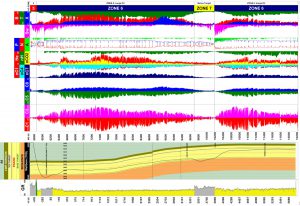In today’s high-stakes drilling environment, speed and accuracy in subsurface evaluation are paramount. Among the cutting-edge technologies revolutionizing near real-time formation evaluation, mass spectrometry stands out as a game-changer. But collecting the data is only part of the equation — interpreting that data accurately and in real time is what transforms information into insight.

What Is Mass Spectrometry While Drilling?
Mass spectrometry is a powerful analytical tool that identifies and quantifies gases and volatile compounds from drilling mud returns. It detects a wide range of hydrocarbon species — from light gases like methane and ethane to heavier aromatics and alkenes — often at part-per-billion (ppb) levels. This granular view of the gas composition can provide early indicators of reservoir quality, fluid type, and even compartmentalization.
Why Interpretation Matters
Collecting mass spectrometry data without expert interpretation is like owning a weather radar but not knowing how to read storm patterns. Interpretation bridges the gap between raw data and actionable geological understanding. Here’s why it’s crucial:
- Real-Time Reservoir Characterization: Expert interpretation helps geologists differentiate between background gas, drilling artifacts, and true formation signals. This allows for more confident geosteering and reservoir mapping.
- Fluid Typing and Zone Delineation: The relative abundances and ratios of detected hydrocarbons can indicate gas vs. oil zones, compositional gradients, or even sweet spots within unconventional plays.
- Operational Decision-Making: Recognizing formation fluids early can guide timely decisions on casing points, coring, or testing — reducing risk and saving costs.
- Enhanced Integration with Other Datasets: When mass spectrometry data is interpreted in conjunction with mudlogging, XRF, or LWD data, it provides a more complete picture of the subsurface.
The FGS Advantage
At Field Geo Services, we don’t just deliver high-resolution mass spectrometry data — we deliver meaningful interpretation you can act on. Our wellsite geologists work hand-in-hand with our in-house geochemistry team to ensure data is calibrated, contextualized, and communicated clearly for seamless importation within our software. We utilize advanced QC protocols, proprietary workflows, and integrated data visualization tools to turn complex data into clear operational guidance.
With decades of experience in geochemical interpretation across basins and plays, FGS empowers clients to drill smarter, faster, and with greater confidence.
Watch the video below to learn more about our proprietary web application for accessing mass spectrometry data and insights in near real-time.
Bottom Line: Mass spectrometry while drilling isn’t just about cutting-edge tech — it’s about knowing what the data means. With expert interpretation, operators can unlock critical insights that would otherwise remain buried below the surface.



[…] don’t just hand off the data at TD. Our interpreted results guide stage placement, frac design, and cluster spacing—tailoring completion strategies to the […]